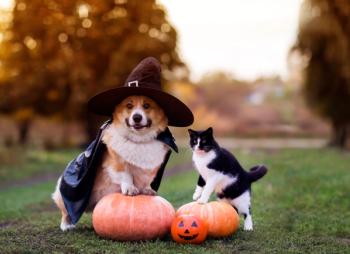The holidays bring great joy and precious time spent with loved ones including family, friends, and beloved companion animals. However, this season is also notorious for bringing a surge of calls to the clinic regarding pets harmed by festive items. Here is a list of some of the most common hazards clients should be aware of during the holidays.
Prepare for an incident
According to the American Veterinary Medical Association,1 it is important clients are prepared before an incident involving toxins or hazards occurs by doing the following:
- Knowing the route to their 24/7 emergency veterinary clinic
- Keeping these numbers in an easily accessible location in case of emergency:
- Their veterinary clinic’s phone number
- Their 24/7 emergency clinic’s phone number
- The ASPCA Poison Control Hotline number (1-888-426-4435)
Decoration hazards
Although ornate decor around the home makes it appear cozy and cheerful, ensure clients keep these items out of reach because they can be dangerous to pets:
- Christmas trees and water additives: Trees can fall over if pets attempt to climb them or play with the decorations. The American Veterinary Medical Association1 (AVMA) advises tying trees to the ceiling or a doorframe using fishing line. Plus, they suggest not adding aspirin, sugar, or anything to the tree’s water that can cause stomach upset for pets.
- Appealing decorations: Items to keep out of reach include tinsel, ornaments, potpourris and more. Pets may eat tinsel out of curiosity, which can cause intestinal blockages. Broken ornaments may cause injuries and, if ingested, could cause intestinal blockage or toxicity. Homemade ornaments, especially those made from salt dough or other food-based materials, could be enticing and pose a threat. Liquid potpourris contain essential oils and cationic detergents that may harm a pet’s skin, eyes, and mouth; solid potpourris can cause complications if consumed.






